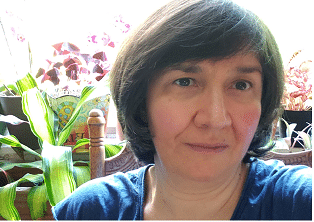Speaking Her Mind

By Robert Lerose
Published August 23, 2021 By The Rutgers University Alumni Association
By her own estimation, Cathy Young has been upsetting people across the political spectrum since her days as a columnist for the Daily Targum. Perhaps, but her opinion writing—appearing regularly in Newsday, The Week, and Reason—is also consistently thoughtful, perceptive, and distinctive. Here, Young RC’88 talks about politics, culture, and searching for the truth.
Why did your family leave the Soviet Union when you were 17?
I guess my family was what you would call internal dissidents who quietly opposed the Soviet regime. There was tacit discrimination against Jews and what many would call state-sponsored anti-Semitism, not to mention the general situation was very oppressive. Access to information was extremely rigidly controlled, for example.
You describe yourself as libertarian/conservative. How would you define that?
A moderate libertarian, though some people would consider that a contradiction in terms. I think a certain degree of social safety nets is absolutely necessary. But I definitely support minimizing regulations that are not necessary for health, safety, and basic survival. In foreign policy, I don’t believe that noninterventions are viable. America has a vital role to play in promoting what some would call liberal values around the world, like standing up to China.
You believe that reality trumps ideology. Could you give an example?
Inasmuch as I have an ideology, it would be pro free markets. On the other hand, I concluded that it’s not feasible at present to have a complete free market approach to health care, for example. It would leave too many places where people couldn’t pay for essential health care. You have to look at the realities of what works and what is humane.
What is your position on the COVID-19 vaccine controversy?
I’m very strong pro-vaccination and getting as close to universal vaccination as humanly possible. A strict libertarian would say being vaccinated should be up to the individual. Well, that’s not really the way things work in a pandemic because your choice affects other people. It’s not just an individual problem.
What about vaccine passports?
Obviously from a philosophical standpoint, we don’t want the government to tell people what to do with their bodies. But if a vaccination mandate is the only way we’re going to avoid a new wave of vaccination resistance, we may have to look at those choices. I’m for respecting individual freedom, but societal self-preservation does need to take precedence.
Which of your pieces has generated the strongest response?
I did a long article about six years ago about a high-profile case at Columbia University involving Emma Sulkowicz, known as Mattress Girl. She accused a fellow student of raping her. He was cleared by the campus disciplinary board, but she turned her senior art project into carrying her mattress around campus as a symbol of her alleged rape and her belief that she didn’t get justice. She got a tremendous amount of publicity, including a long piece in the Columbia Daily Spectator and a front-page story in the New York Times, but nothing from the guy’s point-of-view.
What did you think?
That there was more to the story than was being revealed. I interviewed him, and he showed me a bunch of Facebook messages that I felt were significantly at odds with the story as she told it. There was a lot of backlash [to my reporting] because people were accusing me of being a rape apologist and of victim blaming. At the same time, that was a story that moved the needle in terms of public perception of that case. The Spectator kind of apologized for its overly one-sided coverage and admitted that maybe this guy was innocent. [He] eventually won a settlement from Columbia. I don’t know whether my story contributed to this, but I think it did affect the climate.
Any professors at Rutgers who made a lasting impression?
First and foremost, my senior thesis adviser, Professor William Vesterman [GSNB’71] of the English department. He asked me to talk to his son’s high school class about growing up in the Soviet Union and becoming an American and thought [my story would make] a great book. It ended up becoming my senior thesis first. He gave constructive feedback and could be very tough, but he is really the godfather of my book, Growing Up in Moscow: Memories of a Soviet Girlhood (Ticknor & Fields, 1989).
This interview has been edited for length and clarity.
